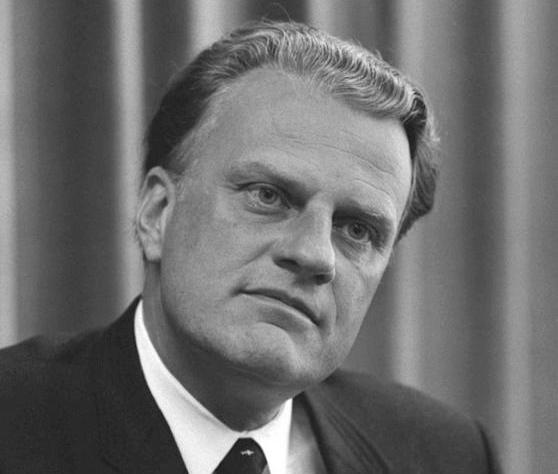In addition to being the supreme evangelist, Billy Graham did much to establish evangelicalism as a potent and popular force in American culture. But his death at age 99 marks a new era, one that has already been taking shape, in which evangelistic Christianity must cope with the loss of its cultural popularity.
The First Great Awakening in the colonial days took place largely within churches, but the Second Great Awakening in the 19th century took place mostly outside the church. Its medium was the revival, the traveling tent meetings that attracted vast crowds gathered to hear evangelistic preaching. Billy Graham brought the revival into the modern world and into the television age.
But he also institutionalized evangelicalism, doing much to change its backwoods, Scopes-trial image into a more sophisticated religious movement that would displace the dominance of liberal mainline Protestantism. Graham was instrumental in founding Christianity Today, which gave evangelicalism a public voice and a forum for thoughtful Christian discussion. He had a huge influence on evangelical colleges and seminaries–Wheaton, Gordon-Conwell, Fuller–many of which blossomed into educational institutions with a quality that could rival or surpass their secular counterparts. These institutions defended the inerrancy of Scripture and other key doctrines against the vaporizing tendencies of theological liberalism. He also helped evangelicals in their good works, in the role he played in the formation of World Vision and World Relief. He was also a key figure in the founding of the National Association of Evangelicals.
Through it all, Graham was likable. He could preach about eternal punishment, but listeners knew he earnestly wanted to save them from that. He was a model of integrity. Yes, he played the role of chaplain to the presidents, and he would later say he should not have become as politically involved as he sometimes did. But for the most part he came across not as someone who frequented the halls of power because of he was power hungry but because he really did offer spiritual support for human beings torn by the demands of public office. A recent episode of The Crown dramatized how helpful he was to Queen Elizabeth, no less, despite her very different background from his. For much of his life, Graham led the “most admired American” surveys every year.
Thus, Billy Graham made evangelicalism culturally popular. Churches that wanted to grow, even those from the Protestant mainline, knew that they needed to become more evangelical or at least seem to be so. The church growth movement was all about injecting evangelical styles and evangelical piety, including techniques adopted from the old revivals with Graham’s media-savvy updates.
And yet, Graham’s legacy and that of the evangelical movement he led gave us the dominance of the para-church, rather than the church. His crusades typically involved getting all of the churches in the city to come together in the initial planning and in the post-crusade follow-up. He certainly supported local churches in this, but he operated outside of their confines. He brought them together, but their distinctive theologies tended to dissolve in his conservative brand of ecumenism, which was still far more theologically robust than the liberal brand of ecumenism. Still, not just his crusades but his publications, colleges, seminaries, mission organizations, and relief organizations were para-church entities, which arguably contributed to the weakening relevance of actual churches.
We confessional Lutherans tended to stay aloof from Graham’s ministries, disapproving of his “decision theology” and his ecumenical methods. Lutheran churches tended not to get involved when one of his crusades came to town, making their point while contributing to their isolation from the culture and the rest of American Christendom.
In today’s climate, evangelical Christianity has lost much of its cultural popularity. For postmodernists, trying to get someone to change his or her religion–to be converted–is taken as an insult. “I have my own beliefs and those are right for me,” the evangelist is likely to hear today. “What right do you have to impose your religious beliefs on me?”
Biblical morality is seen as abhorrent. “Why do you hate gays?” “Your pro-life stance is anti-woman!” “What right do you have to interfere with my sexual freedom?”
In this new era that we have entered, churches that want to grow may have to make themselves seem less evangelical! Already many megachurches have softened their stance on homosexuality and other hot-button moral issues. Others will doubtless remain faithful to their Biblical convictions, but they may have to tone down their “evangelical style.”
Will this post-Billy Graham era be characterized by a revival of theological liberalism, both in revitalized mainline Protestant denominations and in once-evangelical strongholds? There seems to be signs of that happening in the latter case, if not the former, with some erstwhile evangelicals going wobbly on the Bible, creation, and the atonement.
Or will we see the revival–note how I keep using that word– of churches and the distinct theological traditions they represent? Perhaps in a postmodern world, a diversity of perspectives will offer a stronger witness to Christianity than the modernist ecumenical dream.
At any rate, whether evangelicals and other conservative Christians are in a new era or not, what was most important to Billy Graham–converting non-Christians to faith in Christ through the proclamation of the Gospel–will be more urgent than ever.
Photo by Warren K. Leffler [Public domain], via Wikimedia Commons














